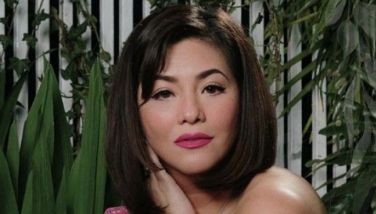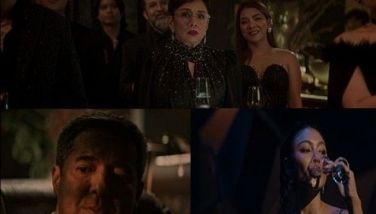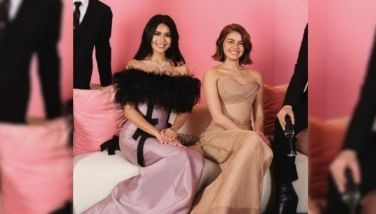Visually-impaired student graduates magna cum laude
About a hundred children lose their vision every week, according to Resources for the Blind. Among the causes of blindness are cataract, poor nutrition and premature birth.
Twins Marco and Ryan were born premature. Unfortunately, Ryan died two days after, due to complications. Erick Marco Ramos lived, and enjoyed a childhood no different from the rest, until he started losing his eyesight because of a condition called Retinopathy of Prematurity.
Despite being visually impaired, Marco graduated from the Philippine Normal University with honors — magna cum laude with a degree in B.S. English. While he was in college, he won regional extemporaneous speaking and writing contests. He was also editor-in-chief of their school paper and president of their debate team.
If I sound I like I’m raving about him, I most certainly am and I hope you don’t mind if I brag on his behalf. I cannot help but be amazed. But I’m also partly disappointed that despite all that he has achieved, he is unemployed. Maybe not for long when you read his story.
I interviewed Marco through e-mail. And I agree with him fully, we all have our disabilities.
What is normal to me, may not be normal to you, and vice-versa. How is it to live with visual impairment?
“The easiest way I can think of to let sighted people into my world is to ask them to do something they consider easy, but do it with a blindfold on. At first, it might seem awkward. It can seem difficult and even impossible at times. It could be frustrating at some point.
“After a few failed attempts, you realize that there has to be a way around the task at hand so you try different methods. Then you realize it is not as difficult as you initially thought. You come up with a variation, a slightly modified way of doing things. To others, it looks or seems weird or unusual but you don’t really care. It gets the job done. That’s the bottom line.
“Then, you come across a task, which you realize is really impossible without sighted assistance. You swallow a bit of your pride and ask someone for help.
“Regarding this topic, the silliest question I have been asked is: ‘How do you take a bath?’ I was so tempted to answer this silly question with a silly answer. I wanted to say: ‘I go to the bathroom, take off my clothes, turn on the shower…’ Basically, we do what you do… the only difference is that we use different methods to do them.â€
You are an inspiration to many, especially since you graduated magna cum laude. How did you do it?
“Graduating with honors is not simple for any person, sighted or otherwise. Hard work, persistence and assertiveness are needed.
“In order to keep up, just keep up. I need to work twice or three times as hard as my peers. I can’t just open a book and read. I can’t just go to the library to look at research sources. I have to prepare my study materials.
“I have to be persistent. I have to go through multiple trial and error cycles to find the methods that work best for me. I have to push myself to deliver what is needed. I have to experience extremely long days and sleepless nights.
“I also had to be assertive in the most positive sense of the word. I have to make others understand that I can do what is expected of me. I had to convince people to take a second look at me and my work.
“Most importantly, I also have to be a people person. I don’t think I can afford not to be. I have to know how to relate well with others. I have to know how to get along with the people I work with.â€
You’re 27 years old when you graduated from college. Tell us about what happened, the challenges of studying with visual impairment, and what kept you going?
“I was not able to attend my grade school graduation ceremony because I had retinal detachment on both eyes. After sixth grade, I had to stop for a year to recover. Doctors were able to restore my functional vision so I returned to school the following year. However, my glaucoma symptoms got worse so I had to leave mainstream school and enroll in a home study program. It took me longer than usual to finish high school because I needed to take breaks from studying because of my eye condition. Back then, I still had the ability to read print but I use special lenses but reading causes too much strain on my eyes.
“High school was just plain terrible. The politics of high school taught me to be tough. I experienced bullying because of my disability. Pranks were not uncommon. Bullies thought that I was an easy target. However, it got to a point that I really got frustrated. So I (literally) pushed a bully against a wall and told him that if he tried one more prank at me, I would send my family after him. The next day, my brother, my dad, and a few of my uncles picked me up from school. After that, bullies were no longer part of my days. I had to learn to stand up for myself.
“What kept me going is the desire to be better. Simple as that. I have a disability; there are things that I can’t do. To compensate, I have to improve the skills that I do have and learn a few more.â€
You mentioned that your family and friends were always very supportive of you. How was your childhood? When did your parents tell you that you would gradually lose your vision? How did you take it?
“Childhood was fun for me. Since I had functional vision, I never felt I was too different. Though I could not play sports or heavy physical games, I thought that I did not miss much.
“I have always excelled in school. I am one of those people who whole-heartedly enjoy studying and find myself good at it. Without bragging too much, I’ve always found school easy.
“When I was 10, the doctors told me and my family that I would eventually lose my vision. We can medicate to delay the progression of the vision loss but it would be inevitable. I guess I was too young to understand what it meant. Young people tend to have the idea that they are invincible. I certainly did then. I thought that it would never happen. Unfortunately, it did happen.
“Of course, it was utterly devastating to know you will lose a faculty. Realizing that I couldn’t do the things I wanted depressed me. Without my favorite activities, I felt like I’m no longer who I am.â€
So, how did you find your self?
“When I became involved with not-for-profits, I met people who are also visually impaired. Seeing that they have fulfilling careers made me realize that there is life after vision loss.
“That was the first step in finding myself. But more importantly, I had to do some serious soul searching. In a way, visual impairment carved me down to the barest essentials. I had to be honest with myself, even brutally honest in some cases. I had to conduct an inventory of my skills.
“Of course, prayers and a strong value system were crucial during this time. Divine guidance was key.â€
Did your family always encourage you, or was the desire innate to pursue your passion, teaching? Would you have pursued other courses if not for your visual impairment?
“My family encouraged but they never imposed. I had to make my own choices. I have always known that I am a language person so a college major in the liberal arts was smart. However, I have also wanted to teach or to go into training. So, I realized to combine both.
“To be honest, visual impairment limited my choices in terms of courses. When I was younger, I told my parents that I wanted to be a forensic pathologist. (Although secretly, I wanted to be a rock star, an international super spy, a Formula 1 race car driver, among other things.)
“However, I imagine that I would still go into teaching or training one way or another.â€
You said you’re having difficulty finding a job. What have you applied for? Do you feel you are being discriminated? Are you ever discouraged?
“I have applied for teaching position in several private high schools in the Manila area. Some of them never responded to my application. Some of them did. But there have been a few instances, which left me to the conclusion that discrimination is still very much present. (Start
playing Welcome to the Real World in the background.)â€
I have faith that something good would come out of this. What are your plans?
“The most immediate plan right now is to get hired. I hope that appearing on various programs will make people take a second look at me. In the future, I would also want to go to graduate school.â€
What are your words of advice to persons with disabilities (PWDs), and to their families? Also, your message to government institutions and the public.
“To PWDs and their families: Don’t hesitate to come to not-for-profits and support groups. Having a circle of people who know what you are going through is important. You will learn so much from them.
“To the government: Even though there are laws protecting PWDs, these are not enough. We should start thinking about a law, which would grant income tax exemptions to PWDs.
“To the public: Just keep an open and welcoming attitude. Please give us a chance. That’s all we’re asking for. We are like you; we only do things a little differently. We all have disabilities. It just so happens that ours is more obvious.â€
Thanks Marco. Thanks for teaching us how to hurdle our own disabilities.
E-mail me at [email protected] and for updates follow me on Twitter @bernadette_ABS. Have a lovely day, everyone.
- Latest
- Trending































